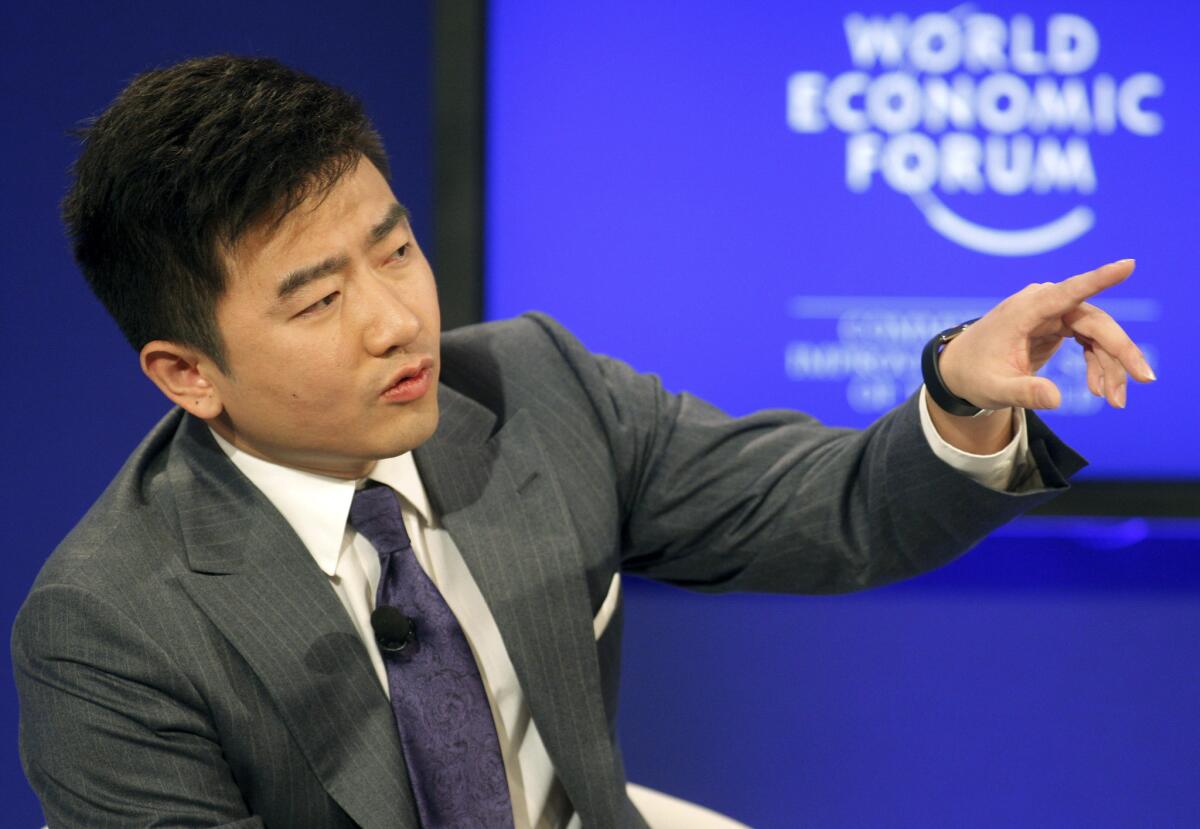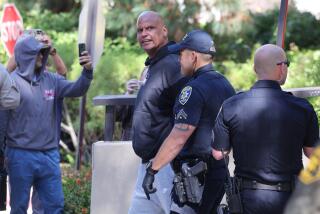China TV anchor known for patriotic views is held in corruption probe

- Share via
Reporting from Beijing — Think of him as China’s Stephen Colbert – only his patriotism shtick isn’t a put-on. For years, TV news anchor Rui Chenggang has been a China booster and an icon for China’s global “soft power” push. But in a development that’s shocked the nation, Rui has been detained on suspicion of corruption, the scourge of the system he has tirelessly touted.
Rui, a host on state-owned China Central Television, or CCTV, was taken away by Chinese authorities on Friday, along with Li Yong, deputy director of the network’s financial news channel, as well as an unnamed producer at the network, the Chinese financial news magazine Caixin reported. One hour before Friday night’s “Economic News,” CCTV’s official social media account still listed Rui as the co-host, but his chair was left empty during program with his microphone still in place.
China’s recent anti-corruption campaign hit CCTV in May, when Guo Zhenxi, president of the network’s financial news channel, was detained by police on corruption charges.
Until his detention on Friday, Rui, through his assistant, had denied he was under investigation for corruption. Authorities have not released any specific charges against Rui, but Chinese press reported that he is suspected of using his connections with senior politicians and business leaders to benefit a marketing company he set up. His lavish lifestyle also fueled speculation about how he could afford the green Jaguar XF he drives and the Zegna suits he loves.
Rui, 37, had an appealing, up-from-the-bootstraps biography. Growing up in an impoverished area of eastern China, Rui scored the highest marks of any student in Anhui province on the nation’s notoriously brutal college entrance exam and entered the Foreign Affairs University in Beijing in 1995. When he completed his studies in 1999 and had a chance to start a career as a diplomat, he chose to join the nation’s state-owned television network instead.
The economy was booming and the country was desperately trying to establish an image of a “new China” in the eyes of western audiences. The young and good-looking Rui, who speaks nearly flawless, American-accented English, was exactly what CCTV was looking for. He quickly rose through the ranks, helping set up the network’s first English-language channel while making a name for himself with a nightly business news program called “BizChina.”
In an interview published on CCTV’s website, Rui said the Western press deeply misunderstood China and many reports were not accurate. He hoped to explain China to the West using the kind of logic Westerners could understand and accept.
Business leaders from various industries became frequent guests of Rui’s program. According to his biography on CCTV’s website, since 1999, Rui had interviewed more than 300 board chairs and chief executives of Fortune 500 companies and more than 30 heads of state.
He also became the network’s go-to reporter for covering international business events such as the World Economic Forum in Davos, Switzerland, where in 2009 he lined up interviews with former British Prime Minister Tony Blair, Craig R. Barrett of Intel and Stephen A. Schwarzman of the Blackstone Group.
But nationalism became Rui’s signature. In 2007, he initiated a campaign against Starbucks, which at the time had an outlet in Beijing’s historic crown jewel, the Forbidden City. On his blog, Rui complained that the presence of such an American brand had “undermined the Forbidden City’s solemnity and trampled over Chinese culture.” Under pressure from the Chinese government, the Seattle-based company eventually closed the branch.
Rui’s bravado grew over the years. In 2010, HE was mistaken for a South Korean reporter and was given a chance to ask President Obama the last question during a Group of 20 summit meeting. Instead of yielding to the other reporter, he seized the opportunity and infamously declared: “I’m actually Chinese, but I think I get to represent the entire Asia.”
During the World Economic Forum in Dalian, China, in 2011, Rui grabbed headlines with a pointed interaction with then-U.S. ambassador Gary Locke. The U.S. diplomat had recently drawn plaudits from ordinary Chinese when it was revealed he flew economy class when traveling on government business -- a penny-pinching policy that senior Chinese officials don’t adhere to. Rui, though, framed the matter more confrontationally: “I heard you flew here coach,” he said. “Is that a reminder that U.S. owes China money?”
Although Rui attracted a substantial fan base among government loyalists, a fair number of Internet users in China -- who tend to be more liberal and more critical of the government than the population at large -- remained skeptical of him.
Following the news of his detention, a number of visitors to his social media page felt compelled to express their schadenfreude at his apparent comeuppance.
“I came here specifically to press ‘like’ after learning the news of your detention,” read one comment.
“You finally cannot represent me to ask Obama a question!” mocked another user.
Tommy Yang in the Times’ Beijing bureau contributed to this report.
More to Read
Sign up for Essential California
The most important California stories and recommendations in your inbox every morning.
You may occasionally receive promotional content from the Los Angeles Times.













